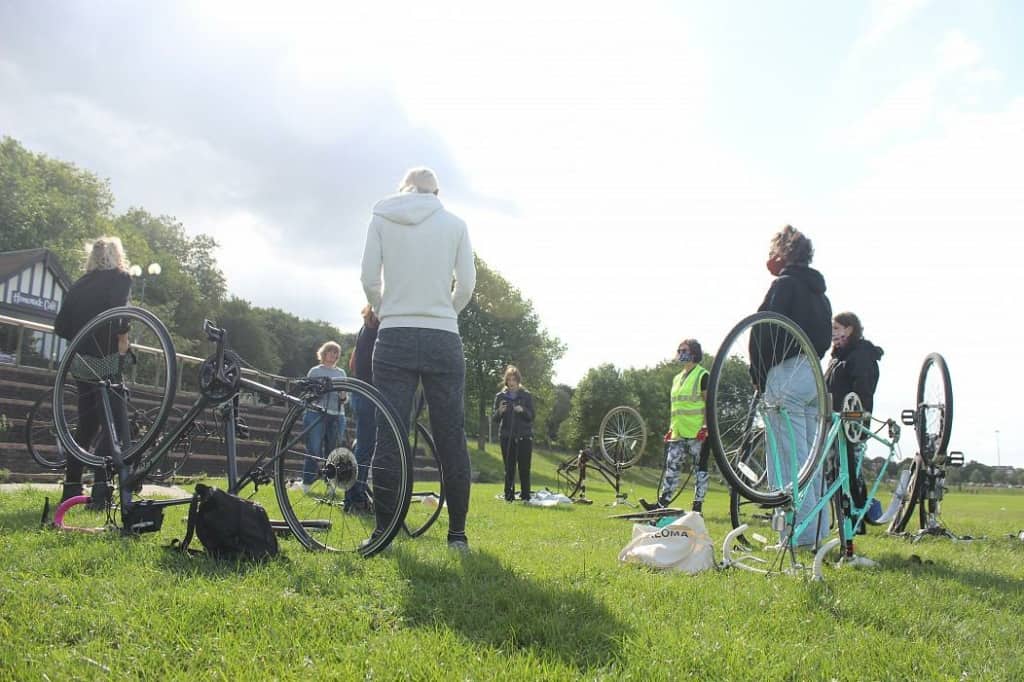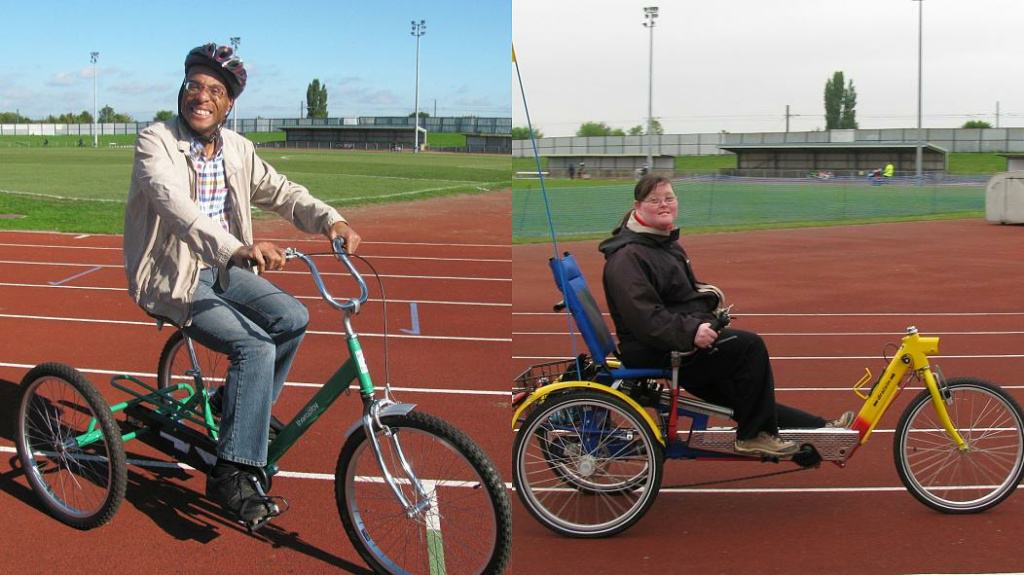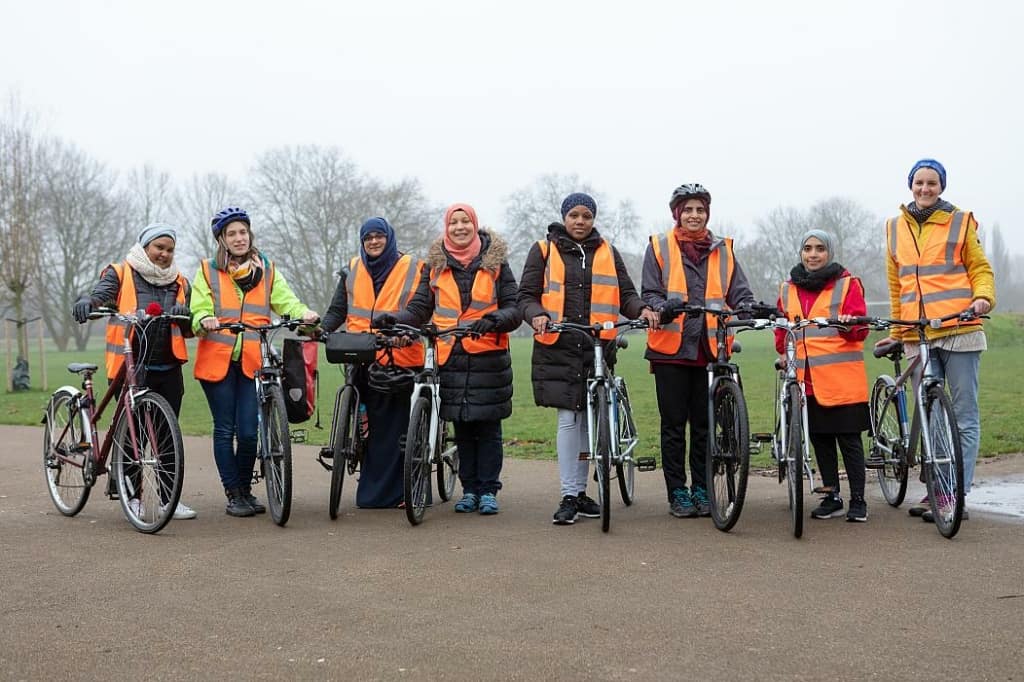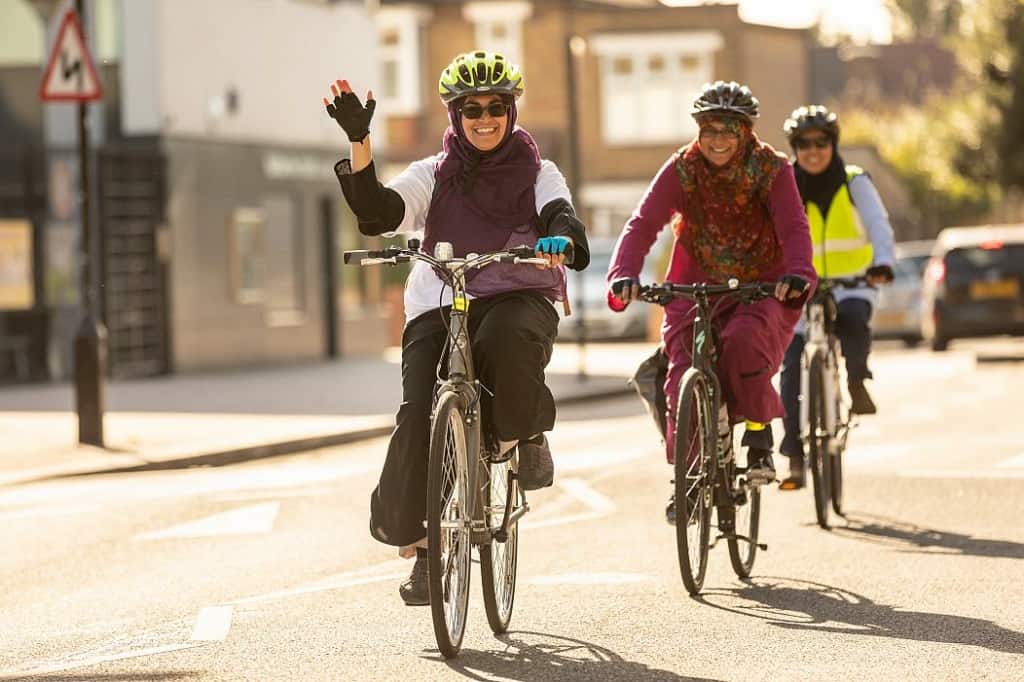Here at Wheels for Wellbeing, we are always on the lookout for fresh perspectives that shine a light on the opportunities beyond “traditional 2-wheel cycling”. Over the past few months we have shared some of these stories and perspectives, from Jamie’s journey into buying and using adult stabilisers, to our Trustee Kevin’s experiences of storing and transporting his crutches when cycling. This week’s blog post talks about the need for greater diversity, covering gender, religion and of course, Disability. We would like to thank Tim Gallagher for letting us re-post his fantastic blog post titled “Why cycling is no longer reserved for white men in lycra”.

Women attend a bike maintenance workshop, Women in Tandem – Amira Lukma, international MA film student
“As a mode of transport cycling has perhaps never been more prominent in the public consciousness.
A combination of COVID infrastructure policy, the need to drastically reimagine our use of transport due to the climate crisis and conversations around mental and physical health – have all led to the simple answer of cycling.
Yet, evidence shows that cycling is the most discriminatory of all outdoor activities in terms of gender, meaning something which should be as easy as riding a bike becomes the proviso of a privileged few.
Social factors including cost and representation create the perception of cycling as being dominated by white, middle-class men. This is doubly unfortunate as, with 75 per cent of cyclists saying their mental health improved, the very communities who may need it the most are the ones feeling the most shut out.
Lily Beaven set up Women in Tandem, a women-focused cycling co-op, in Nottingham, UK, earlier this year. Women in Tandem offer cycle training and bike maintenance classes to help women with confidence on the road, but breaking down practical barriers is only the beginning.
“When I was working in a bike shop previously I was a mechanic and I’d be standing there and a customer would come in, often a man, and say are there any mechanics working here today and I’d be like: ‘yes, hello, I’m here’.
“A lot of women have told me how they’ll go into bike shops and just be talked down to.
“There’s a wider problem,” Lily continues, “it’s that women are discouraged from doing something that is practical, that is DIY, that is doing something for themselves. There’s nothing about a woman that stops her being able to fix her bike any way than it would a man.”
Lily is passionate that incorporating cycling into everyday life can improve travel, combat carbon emissions and have mental and physical health benefits. However, for the women she works with it has a specific boost. “You’re getting somewhere on your own two feet. It’s liberating in a way to get there yourself and know how to fix your bike. You should be proud of yourself,” she says.
There’s nothing about a woman that stops her being able to fix her bike any way than it would a man.
– Lily Beaven
“Ultimately we want to create more of a cycling community in Nottingham for women. I want to bring women together, especially women who are feeling isolated at the moment, to meet new people and share their experiences and just get out regularly on their bikes.”
CYCLING ISN’T ALWAYS ON TWO WHEELS
Down in South London, Wheels for Wellbeing has been helping people with disabilities get into cycling since 2007. Director Isabelle Clement, a keen cyclist herself, is enthusiastic about helping disabled people become more informed on cycling.
“People perceive cycling as just done on two wheels, on a bicycle in traffic, and a lot of people will think well, I can’t do that so I can’t cycle.
“There are huge amounts of different types of cycles and adaptations that can be made. People are not sufficiently aware of all the different, amazing ways of cycling that exist out there.”
As well as campaigning for better disability-inclusive cycling infrastructure and public funding for specialist cycles, Wheels for Wellbeing facilitates disabled people cycling across three inclusive cycling hubs. The hubs are important for those who can’t afford or cannot store their own non-standard bikes.
They also provide a sense of community where people who wouldn’t usually meet in everyday life can exchange information and ideas.

Cycles can come in all shapes and sizes to adapt to accessibility needs – Wheels for Wellbeing
Isabelle applauds new cycling infrastructure policy post-COVID and is hopeful it will create a more inclusive cycling culture in the future.
“The vision for me is a country of cities where everybody cycles as a matter of fact. With disability and impairments come often…increased isolation, lowered ability to be physically active, higher incidents of depression.” She adds that cycling can “uniquely mitigate every single one of those things.
“It’s a hugely beneficial and potentially powerful tool for change in the lives of everybody but particularly in the lives of disabled people.”
PROMOTING A DIVERSE IMAGE OF CYCLING
Khadijah Zaidi is a Ride Leader and Trustee for Cycle Sisters. Established in 2016 in Waltham Forest, they now span two locations and have a 170 strong WhatsApp group. The group breaks down barriers by providing bikes, training and different ability group rides, all geared towards helping Muslim (but not exclusively) women to cycle.
“In the household sharing of responsibilities it’s often women that will share a significant chunk of the burden and so won’t take time for themselves. Our rides are school run friendly; we also have some on the weekend for riders who work as well.
It’s their one chance to get out in the week and do something for themselves.
– Khadijah Zaidi
“We’ve really looked at making them accessible to people who just might not get out otherwise. For some of our riders it’s their one chance to get out in the week and do something for themselves.”

Cycle Sisters – Jenna Selby, Waltham Forest Council

Cycle Sisters – Jenna Selby, Waltham Forest Council
After recently taking part in a Transport for London campaign, Cycle Sisters are keener than ever to promote a diverse image of cycling. “One thing we offer that’s really unique is that welcoming space that shows people visually that they’re welcome.
“If a cycling club is promoting itself with all male or all white riders or people all dressed in lycra…those imageries and that structure of a cycling group could put somebody off.
“We would like to be able to see a world where Muslim women feel enabled, inspired and supported to be able to cycle.”
It’s clear that the social barriers to cycling are as specific and numerous as the benefits it offers. Highlighting these inclusive organisations is an important first step to raising awareness, and each is well placed to tackle these barriers one at a time.
